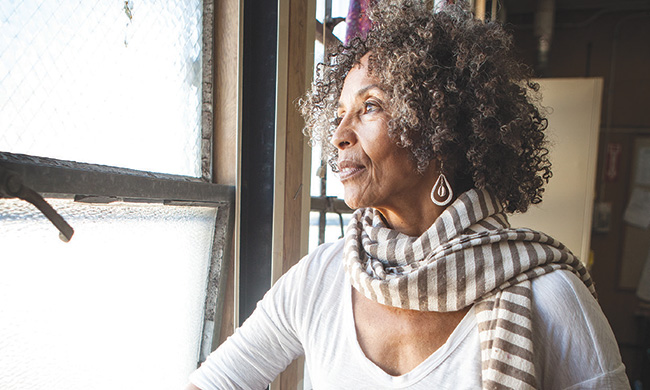
Fania Davis, Ph.D., is a leading national voice on restorative justice. She is a long-time social justice activist, Civil Rights trial attorney, writer, restorative justice practitioner, and educator with a Ph.D. in Indigenous Knowledge. Fania writes and speaks internationally on restorative justice, racial justice, truth processes, and indigeneity.
She will bring that knowledge and experience to Madison as the keynote speaker at the YWCA’s Racial Justice Summit, September 28-30. Madison365 is the media sponsor of the event. Registration is open now.
Fania came of age in Birmingham, Alabama, during the social ferment of the Civil Rights era. She was active in the Civil Rights, Black liberation, women’s, prisoners’, peace, anti-racial violence, economic justice, and anti-apartheid movements. Studying with African Indigenous healers catalyzed Fania’s search for a healing justice, ultimately leading her to serve as Founding Director of Restorative Justice for Oakland Youth (RJOY) and Co-Founding Board Member of the National Association of Community and Restorative Justice (NACRJ).
Her numerous honors include the Ubuntu Award for Service to Humanity, the Dennis Maloney Award for Excellence in Youth Restorative Justice, the Black Feminist Shapeshifters and Waymakers’ Award, the Tikkun (Repair the World) Award, the Ella Jo Baker Human Rights Award, and the Ebony POWER 100 Award. The Los Angeles Times named her a New Civil Rights Leader of the 21st Century.
Fania is the author of The Little Book of Race and Restorative Justice: Black Lives, Justice, and U.S. Social Transformation (2019) as well as a range of articles on restorative justice.
In an email interview, we asked about what she’ll have to say during her visit to Madison.
Madison365: There was a lot of attention on antiracism, diversity and inclusion throughout 2020. Has that momentum slowed down? Has the public attention moved on to other things? If so, what are the implications?
Dr. Davis: Nothing is permanent. Moving in a spiral, life is always changing and transforming itself. Rising and falling; waxing and waning. And then starting up a new cycle again. Life also teaches that two seeming opposites can both be true. In the nation’s history, the abolitionist movement grew and grew until the abolition of slavery and Reconstruction became the law of the land. Two decades later, the momentum slowed and, many of these gains were eviscerated by racial terrorists. Yet ultimately, the anti-slavery movement triumphed, transforming and creating a new future. Then, during the mid-20th century, the Civil Rights movement arose, growing and growing in influence until it prevailed as the public policy of the nation. Yet, after the movement’s momentum slowed, racialized mass incarceration and police terror arose. The Civil Rights movement nonetheless imprinted the collective consciousness and soul, and its impact endured long after the mass actions ended. Similarly, we’re now not only seeing a slowing of the unprecedented momentum of mass demonstrative actions in the wake of the public lynching of George Floyd and with the rise of the Black Lives Matter Movement. We’re also seeing brazen, terroristic attacks against anti-racism. Yet the movement for Black Lives has had an enduring impact. We’ve made huge inroads into the collective consciousness. We are finally breaking through the centuries-long collective denial about our collective biography, about our origins in slavery, the slave trade, genocide, land theft, patriarchy, and colonialism. We are finally telling the truth. We are recognizing the need for repair. Systemic racism and reparations have become household words. Slowed momentum and counter-attacks notwithstanding, we are a different nation today than we were just a few years ago.
Madison365: What’s your main message at the YWCA Racial Justice Summit going to be?
Dr. Davis: First, kudos to the YWCA for being on the front lines for gender equity and racial justice for almost 150 years.
Also, I’ll want to express gratitude to YWCA for the ways it has impacted my and my family’s life on personal levels
I’ll also address the important question of the current state of our movements and our nation.
In a restorative justice vein, I’ll further address how I believe history is calling upon us to be both champions of justice and healing, not just one or the other. In non-binary fashion, we need both. One of the reasons we as a nation are trapped in history’s pain and in these repeating patterns of racial terror and trauma is because we have not engaged with deep intentionality in a collective healing process.
Madison365: Madison thinks of itself as a particularly “progressive” city but racial disparities here are worse than just about anywhere else in the country. What specific message do folks in a town like Madison need?
Dr. Davis: Madison is an overwhelmingly white city – 77%. The state of Wisconsin is even more overwhelmingly white – 87%.
I will discuss the special responsibility to model what it means to be an anti-racist white person. To educate oneself about slavery, genocide and all their afterlives. To support reparations at local and federal levels (including HR40 at the federal level). To engage in respectful power-sharing dialogues with indigenous and Black people in the state. To understand this is not something one altruistically does for people of color, but something one does for oneself. To understand that white people have skin in the game, and they do this work to restore their own humanity. They do it for their descendants.
More information about the Racial Justice Summit is available here.



